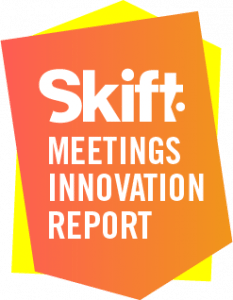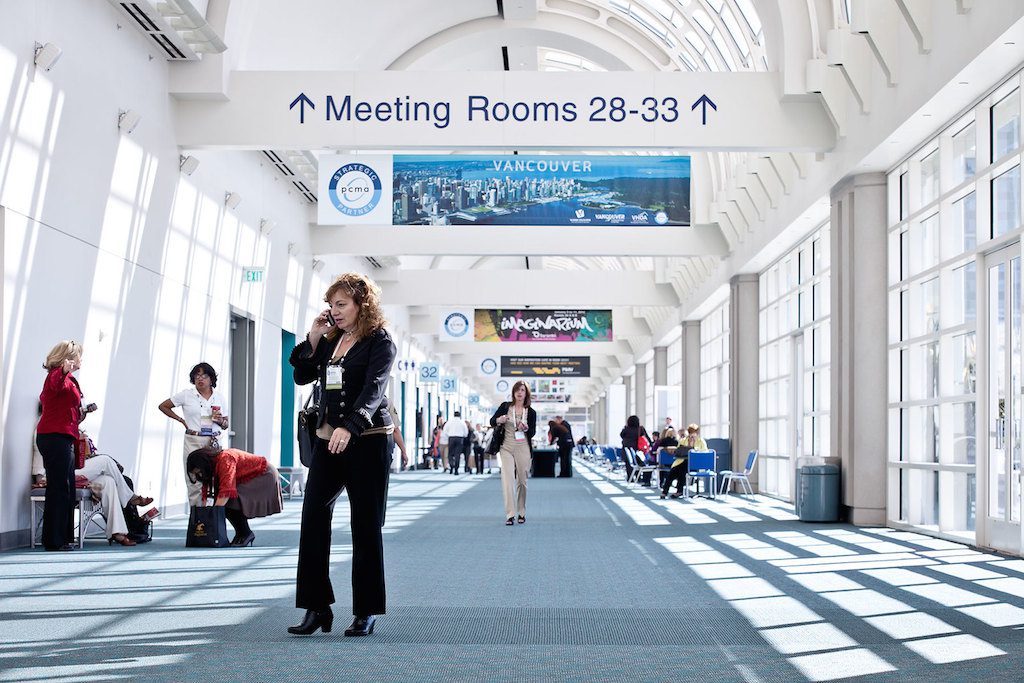Skift Take
Event attendees need places to work, decompress, and put their food down. As obvious as it sounds, these spaces can be hard to find at conferences due to poor venue design. Not only does this have a negative impact on guest mood, it can also lead to more food waste.
 Events are often huge displays of over-the-top hospitality, offering all-you-can-eat meals and tons of free products for guests to take home. In fact it’s what attendees have come to expect. This makes events a perfect target for reducing environmental impact. However there’s a constant tug back to the status quo.
Events are often huge displays of over-the-top hospitality, offering all-you-can-eat meals and tons of free products for guests to take home. In fact it’s what attendees have come to expect. This makes events a perfect target for reducing environmental impact. However there’s a constant tug back to the status quo.
Proponents of sustainability might feel like they’re fighting a losing battle. While big, cultural practices may take a long time to change, there are small, inexpensive things planners can do to make a venue more environmentally friendly.
We look into PCMA’s most recent Convening Leaders report and explore how something as simple as furniture placement can make a big difference.
Check out the story below.
If you have any feedback about the newsletter or news tips, feel free to reach out via email at [email protected] or tweet @ikcarey.
— Isaac Carey, Travel Reporter
THE FUTURE OF EVENTS AND MEETINGS
A Venue’s Layout Matters When It Comes to an Event’s Environmental Impact: Clearly small details can have a pretty big impact on the social and environmental effects of a business event. While many of these details aren’t under planners’ control, others might be as simple as adding an extra few tables.
Meetings Sector Tries to Strike the Right Balance With Mobile Apps: Apps are a great way to provide event attendees with information but they can easily get overwhelming. When it comes to tech, event organizers need to weigh pluses and minuses between depth and simplicity.
Southeast Asia’s Traveloka Pushes Further Into Events: Looks like Traveloka is wading deeper into events such as concerts and sports, a big business in Southeast Asia with the biggest gatherings drawing huge local and regional crowds. Its investment in an events technology company shows the potential of tours and activities hasn’t been tapped yet.
AROUND THE INDUSTRY
Taco Bell Is Pretty Serious That Its Pop-Up Hotel Won’t Be Its Last: Every non-hotel brand thinks it is a hospitality company. However, as popular and successful a run as Taco Bell has enjoyed in recent years, it does not have the level of expertise to run a hotel over the long haul on its own.
Guest Behavior Is Key Part of the Lux Hospitality Equation: Luxury travelers often deconstruct what goes into the makings of great hospitality. It’s also necessary, however, to ask what is required of guests so that they hold up their end of the bargain. It’s a two-way street, and all too often we ignore one side of the equation.
Expedia to Connect Travelers With Hotels When Their Flights Are Delayed: Expedia wants to help put customers in touch with hotels to sort out travel complications. That seems like it would be a complicated dance because Expedia doesn’t readily share much customer information with hotels, a longtime grievance in the lodging industry.
Subscribe
Skift Senior Enterprise Editor Andrew Sheivachman [[email protected]] curates the Skift Meetings Innovation Report. Skift emails the newsletter every Wednesday.
Have a confidential tip for Skift? Get in touch
Tags: climate change, meetings, meetingsiq, sustainability
Photo credit: PMCA Convention at the San Diego Convention Center, January 2012. San Diego Convention Center / Flickr

